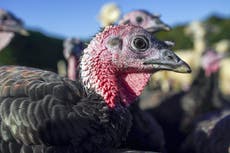Bird flu: Poultry ordered to be kept indoors across England
Farmers and the government are battling Britain’s worst ever outbreak of the disease


All poultry must now be kept indoors across England, the government has ordered as it steps up measures to tackle the UK’s worst ever outbreak of bird flu.
The mandatory requirement means all bird-keepers face legal action if they fail to move their flocks inside and introduce stringent biosecurity measures by Monday 7 November.
More than 200 cases of the disease, also known as highly pathogenic avian influenza, have struck premises across the country and resulted in the culling of at least three million birds. Some 70 cases have been identified since the beginning of October
Tens of thousands of wild birds, including globally important populations of rare sea birds, have also died due to the outbreak of the disease which originally spread from intensively farmed poultry in east Asia.
The UK government’s order comes following an increase in the national risk of bird flu in wild birds to “very high”.
The UK’s chief veterinary officer, Christine Middlemiss said: “We are now facing, this year, the largest ever outbreak of bird flu and are seeing rapid escalation in the number of cases on commercial farms and in backyard birds across England.
“The risk of kept birds being exposed to disease has reached a point where it is now necessary for all birds to be housed until further notice.
“Scrupulous biosecurity and separating flocks in all ways from wild birds remains the best form of defence. Whether you keep just a few birds or thousands, from Monday 7 November onwards you must keep your indoors.
“This decision has not been taken lightly, but is the best way to protect your birds from this highly infectious disease.”
The housing order comes after a national “avian influenza prevention zone” (AIPZ) was declared by the government earlier this month, requiring bird keepers to implement the "highest level of biosecurity measures".
But now keepers are being asked to move their birds inside, with no detail from the government on how long this will be required.
In a statement on Monday, the government said its evidence “shows that housing birds reduces the risk of kept birds being infected with bird flu”.
But officials warned: “Housing alone will not protect birds and all keepers must still follow the other enhanced biosecurity measures mandated by the AIPZ at all times to protect their flocks and prevent the risk of future outbreaks which is circulating in wild birds.
“Housing combined with stringent biosecurity measures can provide even greater reduction in risk.”
The existing AIPZ means that all bird keepers need to take extra precautions, such as restricting access for non-essential people on site, ensuring workers change clothing and footwear before entering bird enclosures and cleaning and disinfecting vehicles regularly to limit the risk of the disease spreading.
The government said: ”UK Health Security Agency continue to advise that the risk to public health from the virus is very low and the Food Standards Agency advice remains unchanged, that avian influenzas pose a very low food safety risk for UK consumers. Properly cooked poultry and poultry products, including eggs, are safe to eat.”
Join our commenting forum
Join thought-provoking conversations, follow other Independent readers and see their replies
Comments


Bookmark popover
Removed from bookmarks